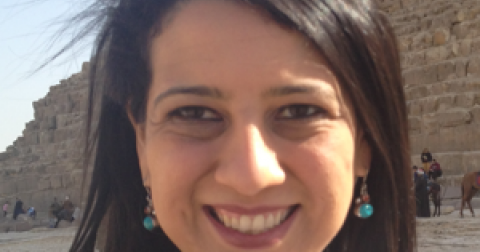
Panel Discussion with Nancy Youssef, Professor Zareena Grewal and Dr. Hani Mowafi
Co-sponsored by the MacMillan Center, the Council on Middle East Studies, the Department of Emergency Medicine, the Program on Refugees, Forced Displacement, and Humanitarian Responses, and the Center for the Study of Race, Indigeneity, and Transnational Migration.
About the Speaker
Nancy A. Youssef is an Egyptian-American journalist currently working as a national security correspondent for BuzzFeed News. She was previously a national security correspondent for The Daily Beast and McClatchy Newspapers. Youssef began her career in journalism at the Baltimore Sun.She then moved on to work for the Detroit Free Press, where she covered legal issues. At the Detroit Free Press, Youssef reported on the Iraq war for the media conglomerate, Knight Ridder. She traveled throughoutJordan and Iraq from the start of conflict through the post-war period. In August 2005, Youssef joined the Washington Bureau at McClatchy. She spent four years covering the Iraq war and served as chief of the Baghdad bureau. Her work focused on the Iraqi citizens, centering on how the U.S. military strategy was influencing the social and political dynamic. Her pieces reflected on the everyday life of the Iraqi people and coverage of civilian casualties. After that, she served as McClatchy’s chief Pentagon correspondent, continuing her coverage of both the conflict in Iraq and in Afghanistan, traveling overseas to report on the latest developments. Youssef also served as president of the Pentagon Press Association. As Middle East bureau chief for McClatchy, Youssef covered the events of the 2011 Egyptian Revolution. Until recently, she served as Senior National Security Correspondent for The Daily Beast. In 2017, she joined BuzzFeed News on the same beat.
Zareena Grewal is a historical anthropologist and a documentary filmmaker whose research focuses on race, gender, religion, nationalism, and transnationalism across a wide spectrum of American Muslim communities. Her first book, Islam is a Foreign Country: American Muslims and the Global Crisis of Authority (NYU 2013), is an ethnography of transnational Muslim networks that link US mosques to Islamic movements in the post-colonial Middle East through debates about the reform of Islam. Her first film, By the Dawn’s Early Light: Chris Jackson’s Journey to Islam (Cinema Guild 2004), examines the racialization of Islam and the scrutiny of American Muslims’ patriotism long before September 11 2001. Her forthcoming book, titled “Is the Quran a Good Book?”, combines ethnographic and cultural studies analyses with historical research to trace the place of the Islamic scripture in the American imagination, particularly in relation to national debates about tolerance. She has received awards for her writing and research grants from the Fulbright, Wenner-Gren and Luce Foundations. Her citizen-reporting and essay in the New York Times helped spark a Pentagon investigation into the bombing of a civilian neighborhood by the US military and a concession by the Coalition that it’s strike intending to target an “ISIS warehouse” did indeed strike the civilian home of the Rezzo in suburban Mosul.
Dr. Hani Mowafi’s interests are in developing the science and practice of emergency care with a special emphasis on low- and middle-income countries where the burden of emergency conditions is greatest and there is an unmet need for emergency services. His public health interests include defining characteristics of global emergency care systems; evaluating the burden of injury in low- and middle-income countries and addressing health and human security in chronic humanitarian emergencies. He has 15 years of experience in consulting and research in emergency medicine and global public health. Dr. Mowafi’s current research includes evaluation of health data from network of trauma hospitals operating inside war-affected Syria; modeling the household income effects of road traffic injury in rural Uganda; evaluating the performance of chief complaint as a descriptive indicator of emergency care in low-resource settings globally. Dr. Mowafi is an Assistant Professor of Emergency Medicine and Chief of the Section of Global Health and International Emergency Medicine. He also serves as the Director of the GHIEM Fellowship. Dr. Mowafi was trained in Biomedical Engineering at Duke University, has a degree from Medicine from the University of Virginia, a Masters of Public Health in International Health from Harvard University, and a certificate in Humanitarian Studies from the joint program on humanitarian studies at Harvard/MIT/Tufts. Dr Mowafi will discuss using public health approaches to studying mortality and excess mortality in conflict.